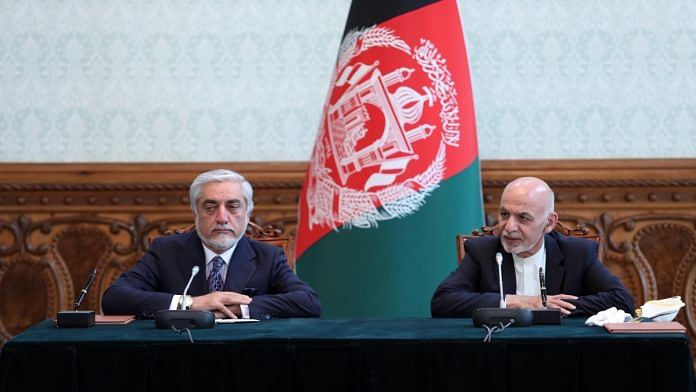New Delhi: Afghan leader Abdullah Abdullah will be arriving in India for a three-day visit starting 6 October, Tuesday, amid the ongoing peace talks between Kabul and Taliban leaders.
Abdullah is the chairman of the High Council for National Reconciliation (HCNR), which is overseeing the country’s talks with the Taliban for a power-sharing deal.
The visit comes less than a month since the US Special Representative on Afghanistan Reconciliation Ambassador Zalmay Khalilzad landed in New Delhi for a day’s trip, where he met External Affairs Minister S. Jaishankar, National Security Adviser Ajit Doval and Foreign Secretary Harsh V. Shringla in New Delhi.
Abdullah, who is considered to be a “friend of India”, is also expected to meet Jaishankar and Doval during his visit, apart from J.P. Singh, Joint Secretary (Pakistan, Iran and Afghanistan), Ministry of External Affairs.
He might call on Prime Minister Narendra Modi but that is not yet confirmed, diplomatic sources told ThePrint.
During this visit, Abdullah is expected to urge India to seek a greater role in the ongoing intra-Afghan talks and engage with the Taliban as the “next logical step”, sources said.
India yet to talk to Taliban
Ever since the US and the Taliban started discussing ending the war in 2018, before finally signing a deal in February 2020, India has remained firm on not speaking to the Taliban.
India has maintained all through the peace talks between the US and Taliban leaders that it will not directly negotiate with the latter. According to sources, however, now that the intra-Afghan talks have started between a cross-section of the Afghan leadership and the Taliban, New Delhi should open “some channels of communication” with them so as to understand how it can remain engaged in the dialogue, which began in Doha on 12 September.
Jaishankar addressed the opening day of the talks, via video-conferencing, and said that the peace dialogue between the Ashraf Ghani government and the Taliban should also ensure the interest of minorities, women and the vulnerable, and effectively address “violence across the country”.
The foreign minister also met and discussed the Afghan peace process with senior Afghan leader Marshal Abdul Rashid Dostum, who was on a personal visit to India last month. During the meeting, Jaishankar reiterated that New Delhi remains committed to Afghan-led, Afghan-owned and Afghan-controlled negotiations.
Dostum, a controversial Uzbek warlord, has now been accorded the rank of Marshal as part of the new power-sharing deal between Afghan President Ashraf Ghani and his rival Abdullah Abdullah. He is regarded to be significantly influential in Afghanistan.
Sources said talking to the Taliban will also enable New Delhi to understand the stance taken by Islamabad in the negotiating process.
“Dr Abdullah is an important leader in a key position and a close friend of India, and would be coming to brief us on the peace process and his visit to Pakistan. He may also seek greater involvement by us in the process,” said Gautam Mukhopadhyay, former Indian ambassador to Afghanistan, Myanmar and Syria.
Also read: As Taliban-Afghan govt talk peace, lessons from an Afghan hero killed 19 years ago
Abdullah’s visit comes on the back of one to Pakistan
Before his upcoming visit to India, Abdullah made a trip to Pakistan where he is believed to have engaged with Islamabad in a more conciliatory manner.
Abdullah has otherwise been a staunch critic of Pakistan, accusing it of promoting and sponsoring the Taliban and fanning the 19-year war in his country.
During his meeting with the Pakistani leadership this time, he is believed to have taken a new approach. He even told The Dawn in an interview that Pakistan and Afghanistan are on the “same page” in seeking reduction of violence and bringing the intra-Afghan talks to a fruitful conclusion.
“Enjoyed meeting Dr Abdullah Abdullah, Chairman HCNR of Afghanistan. We had a very interesting conversation: theme being the Past is an invaluable teacher to learn from but not to live in. We must look forward towards the future. I wish him all the success in his mission,” tweeted Prime Minister Khan after their meeting on 30 September.
Enjoyed meeting Dr Abdullah Abdullah, Chairman HCNR of Afghanistan. We had a very interesting conversation: theme being the Past is an invaluable teacher to learn from but not to live in. We must look forward towards the future. I wish him all the success in his mission.
— Imran Khan (@ImranKhanPTI) September 30, 2020
Rakesh Sood, veteran diplomat and former envoy to Afghanistan, told ThePrint, “There has not been a senior-level visit from Afghanistan for a long time and so this is an opportune time for Dr Abdullah to visit India and brief the leadership on the ongoing talks. The whole world is engaging with the Taliban and, if we do not, then how can we be engaged in the intra-Afghan dialogue? Further, it is only by speaking to the Taliban that we will get to know their thinking about India’s role, and other countries in the region.”
Also read: India took the high moral ground by not talking to Taliban and lost influence in Afghanistan




Indian government and politicians are worried about minorities in Afghanistan but never uttered a word when innocent defenceless Muslims were lynched and their business and property looted and their women raped by fascist Hindutva shameless terrorists
Worst level of hypocrisy